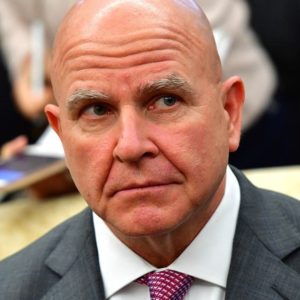Security Studies Program
Take a practitioner’s view of the most difficult national security challenges the United States.
July 24–28, 2023
Washington, DC
In the final week of the Political Studies Program, fellows will turn to the study of America and the world.
One seminar will explore a classic international relations text—Thucydides’ The Peloponnesian War—and the important, and even unusual, insights into strategy it provides us in the present day. The second will explore the concept of grand strategy in American foreign policy, with a focus on the challenges and opportunities facing the United States in the contemporary era.
Image Credit: Globe, Ryan Gacayan, via Flickr
Jakub Grygiel on Caesar Augustus' foreign policy lessons
This course is part of our residential Political Studies Program. Fellows participate in morning seminars and meet prominent men and women in public life over afternoon and evening sessions. Up to 36 fellows will be selected.

Colin Dueck is a professor in the Schar School of Policy and Government at George Mason University and a fellow at the American Enterprise Institute. He has worked as a foreign policy adviser on Republican presidential campaigns, and acted as a consultant for the State and Defense Departments and the National Security Council.

Colin Dueck is a professor in the Schar School of Policy and Government at George Mason University and a nonresident fellow at the American Enterprise Institute.
He has worked as a foreign policy adviser on several Republican presidential campaigns, and acted as a consultant for the Department of State, the Department of Defense, and the National Security Council. His current research focus is on the relationship between party politics, presidential leadership, American conservatism, and U.S. national security strategies.
Dueck has published four books on American foreign and national security policies: Age of Iron: On Conservative Nationalism (Oxford University Press, 2019), The Obama Doctrine: American Grand Strategy Today (Oxford 2015), Hard Line: The Republican Party and U.S. Foreign Policy since World War II (Princeton 2010), and Reluctant Crusaders: Power, Culture, and Change in American Grand Strategy (Princeton 2006).
He has provided congressional testimony and published articles on these same subjects in journals such as International Security, Orbis, Security Studies, Review of International Studies, Claremont Review of Books, Political Science Quarterly, American Affairs, and World Policy Journal, as well as online at RealClearPolitics, National Review, Foreign Affairs, Ricochet, the National Interest, Providence, the American Mind, Texas National Security Review, War on the Rocks, Ambassador’s Brief, and the New York Times.
Dueck studied politics at Princeton University and international relations at Oxford under a Rhodes Scholarship.

Jakub Grygiel is an Associate Professor at the Catholic University of America. From 2017–18, he was a member of the Policy Planning Staff at the U.S. Department of State. His most recent book is Return of the Barbarians: Confronting Non-State Actors from Ancient Rome to the Present.

Jakub Grygiel is an Associate Professor at the Catholic University of America. From 2017–2018, he was a senior advisor to the Secretary of State in the Office of Policy Planning working on European affairs.
Previously, he was a Senior Fellow at the Center for European Policy Analysis and on the faculty of SAIS-Johns Hopkins University. He has previously worked as a consultant for the OECD in Paris and the World Bank in Washington.
His most recent book is Return of the Barbarians: Confronting Non-State Actors from Ancient Rome to the Present. He is coauthor of The Unquiet Frontier: Rising Rivals, Vulnerable Allies, and the Crisis of American Power (with A. Wess Mitchell) and also the author of Great Powers and Geopolitical Change. His writings on international relations and security studies have appeared in The American Interest, Journal of Strategic Studies, Orbis, Commentary, Joint Forces Quarterly, Political Science Quarterly, as well as U.S., Swiss, Polish and Italian newspapers. He earned a Ph.D., M.A. and an MPA from Princeton University, and a BSFS Summa Cum Laude from Georgetown University.
Readings:
Discussion Questions:
Readings:
Discussion Questions:
Readings:
Discussion Questions:
Readings:
Discussion Questions:
Readings:
Discussion Questions:
Readings:
Discussion Questions:
Readings:
Discussion Questions:
Readings:
Discussion Questions:
Readings:
Discussion Questions:
Readings:
Discussion Questions:
Mick Ryan
Mick Ryan is a retired major general in the Australian Army. He is now an adjunct fellow at the Center for Strategic and International Studies in Washington DC, and a non-resident fellow of the Lowy Institute in Sydney. In January 2023 Mick was also appointed as an Adjunct Professor at the University of Queensland in Brisbane, Australia.

Vance Serchuk
Vance Serchuk is Executive Director of the KKR Global Institute and an Adjunct Senior Fellow at the Center for a New American Security. Prior to joining KKR, Mr. Serchuk served for six years as the senior national security advisor to Senator Joseph Lieberman (I-Connecticut).

Daniel Blumenthal
Dan Blumenthal is a senior fellow at the American Enterprise Institute, where he focuses on East Asian security issues and Sino-American relations. Mr. Blumenthal has served in and advised the US government on China issues for more than a decade.

Christian Brose
Christian Brose is a Senior Fellow at the Carnegie Endowment for International Peace and the Head of Strategy at Anduril Industries, prior to which he served as staff director of the Senate Armed Services Committee. He was also responsible for leading the production, negotiation, and passage of four National Defense Authorization Acts, which set policy and authorized spending for all U.S. national defense activities.

Matthew Kroenig
Matthew Kroenig is a Professor in the Department of Government and the Edmund A. Walsh School of Foreign Service at Georgetown University. A 2019 study in Perspectives on Politics ranked him as one of the top 25 most-cited political scientists of his generation. He has served in several positions in the U.S. Department of Defense and the intelligence community in the Bush and Obama administrations.

H.R. McMaster
H. R. McMaster is the Fouad and Michelle Ajami Senior Fellow at the Hoover Institution, Stanford University. Previously, he served as the 26th assistant to the president for National Security Affairs and as a commissioned officer in the United States Army for 34 years before retiring as a Lieutenant General. He is author of Battlegrounds: The Fight to Defend the Free World.

Donald Kagan
Donald Kagan was the Sterling Professor Emeritus of Classics and History at Yale University. His four-volume History of the Peloponnesian War is the leading scholarly work on the subject. He was also the author of many books on ancient and modern topics, including On the Origins of War and the Preservation of Peace.